Abstract
This study compared prophylactic administration of either intragastric misoprostol (200 micrograms four times a day), a prostaglandin E1 analog, or bolus intravenous cimetidine (300 mg every 6 hours) in preventing stress lesions and stress bleeding in 127 adult postoperative patients who required mechanical ventilation and also had developed hypotension or sepsis. Both drug treatments were equally effective in preventing the development of diffuse gastritis (greater than 10 gastric hemorrhagic lesions) and in preventing upper gastrointestinal hemorrhage (UGIH). The combined data from both groups showed that for the 44 (35%) patients who died, death was significantly associated with the presence at study entry of renal failure (64% of 25 patients with renal failure died), hepatic failure (57% of 23 patients) or coagulopathy (62% of 29 patients) (p less than 0.02 for each), and with the number of organ system failures at study entry (48% of 69 patients with multiple organ system failures died, p less than 0.001). Death was also significantly associated with the presence of adult respiratory distress syndrome (ARDS) at study entry or the development of ARDS (63% of 24 patients with ARDS died, p less than 0.001), and the development of UGIH (5% of 93 patients with known bleeding outcome died, p less than 0.05). The number of stress lesions that developed was significantly associated with subsequent UGIH (p less than 0.001). Additional organ system failure developed during the study in 31% of the 127 patients, as did diffuse gastritis in 20% of 111 patients who had a follow-up endoscopy. These results demonstrate that postoperative patients who require mechanical ventilation and have hypotension or sepsis are at significant risk for the development of stress gastric lesions and multiple organ system failure even when prophylaxis for stress ulcers is provided. Furthermore, the presence of ARDS, renal failure, hepatic failure, coagulopathy, and UGIH are significantly associated with death.
Full text
PDF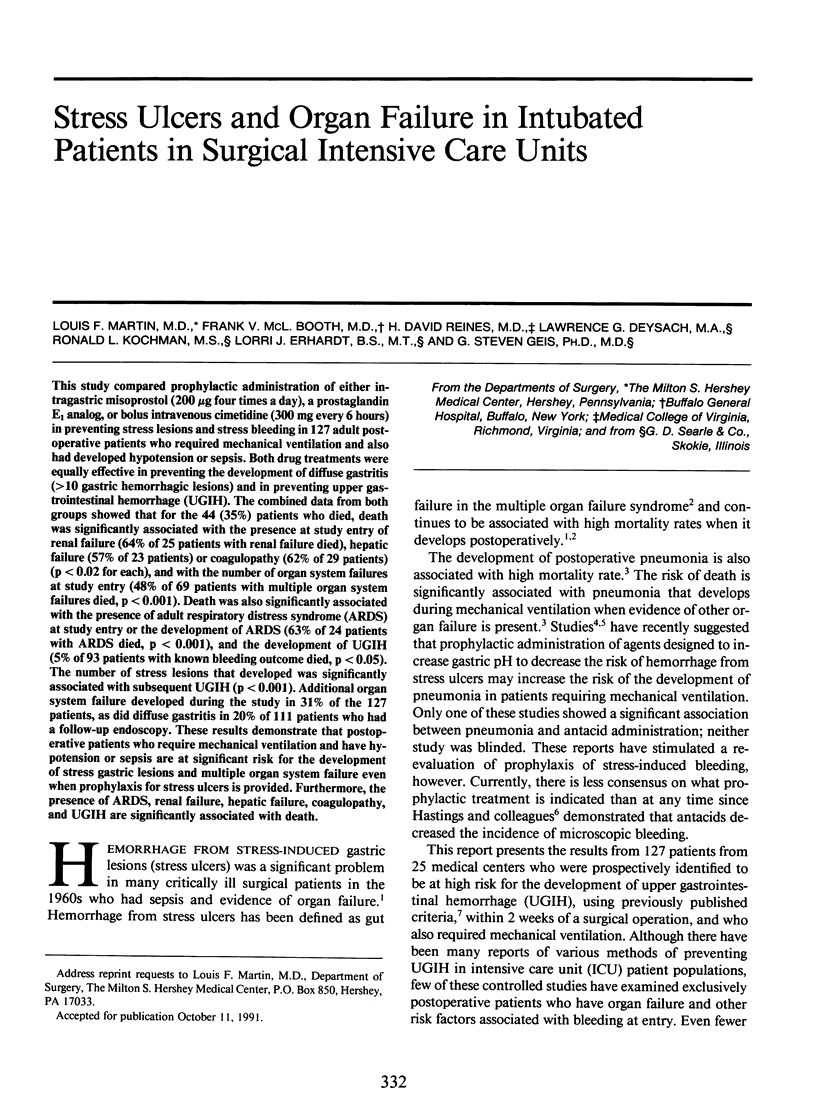
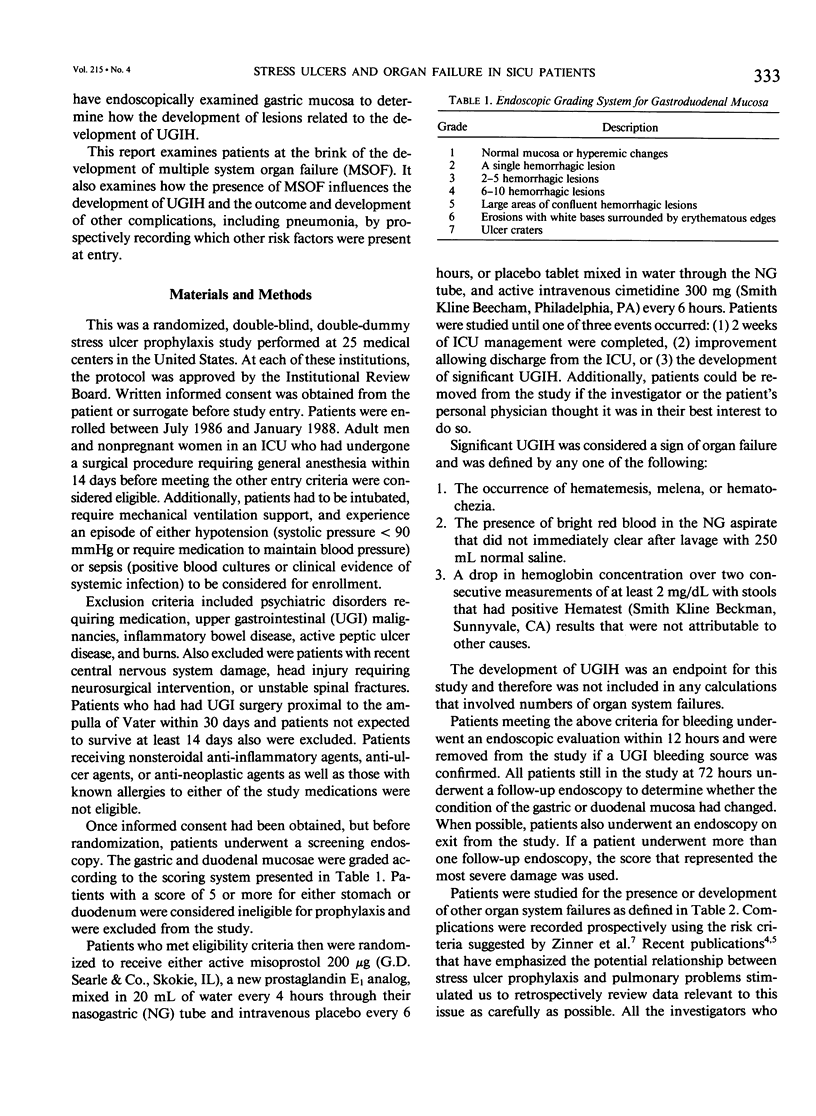
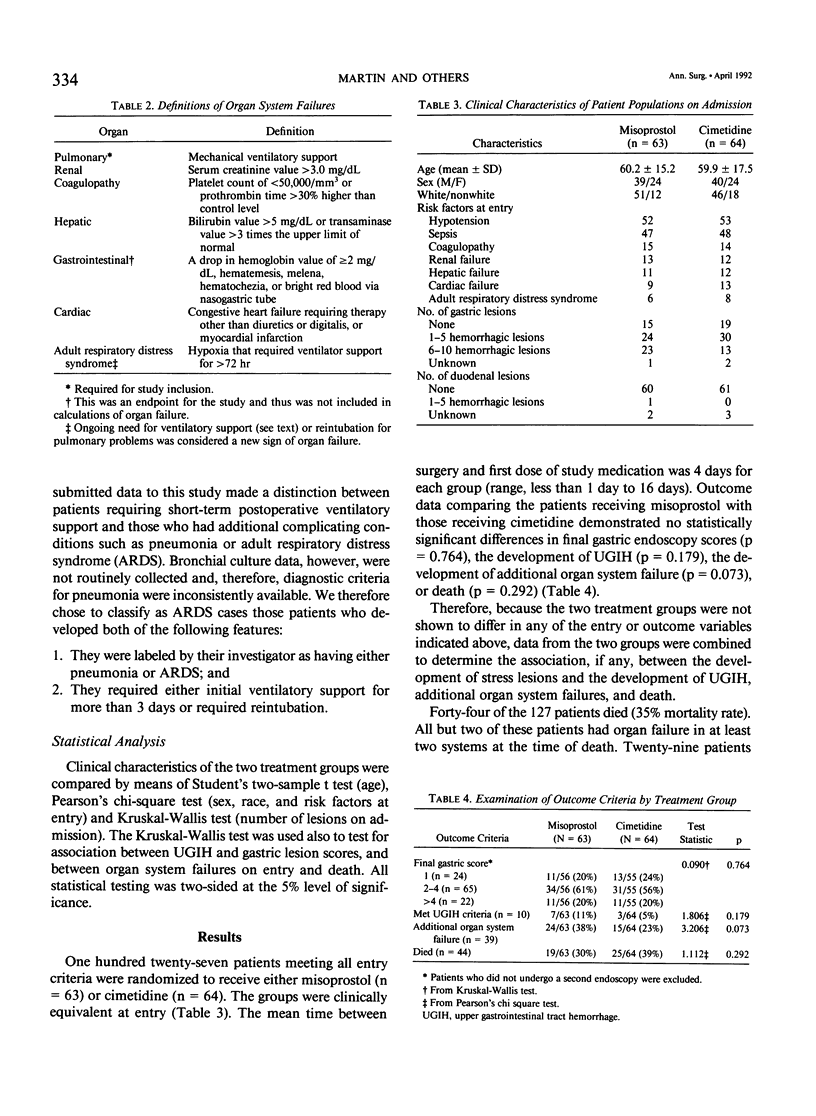
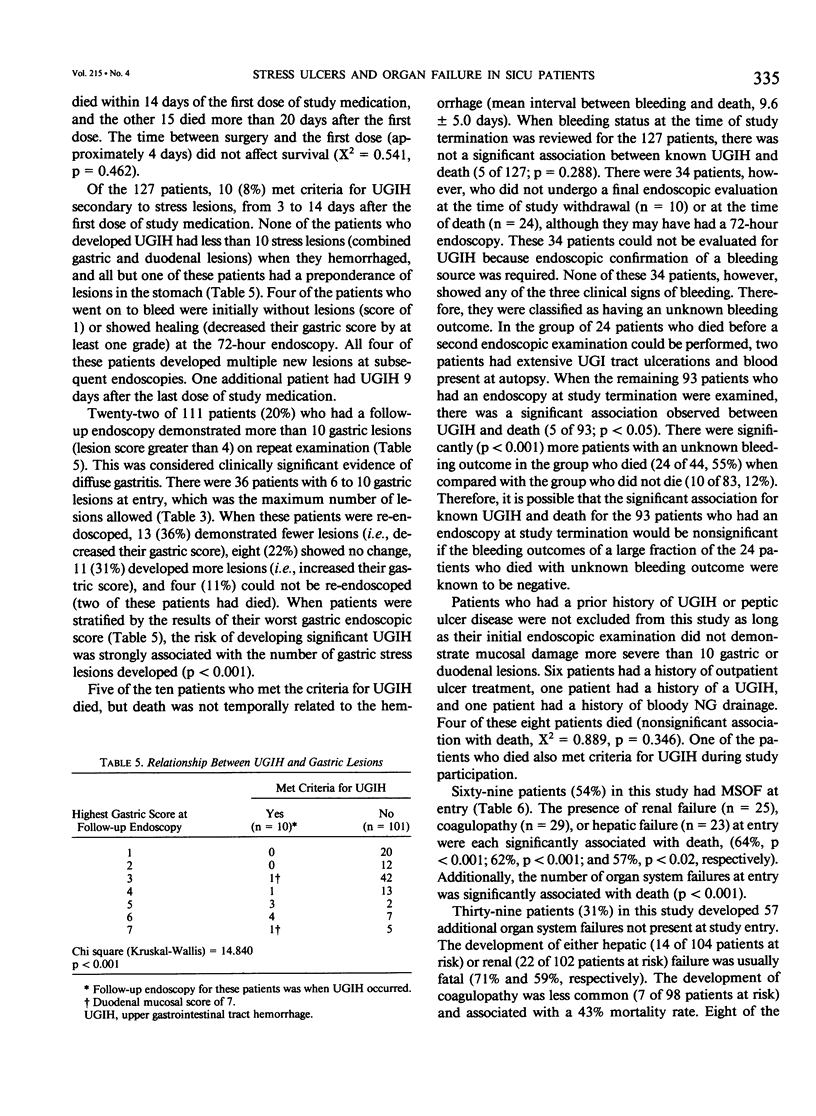
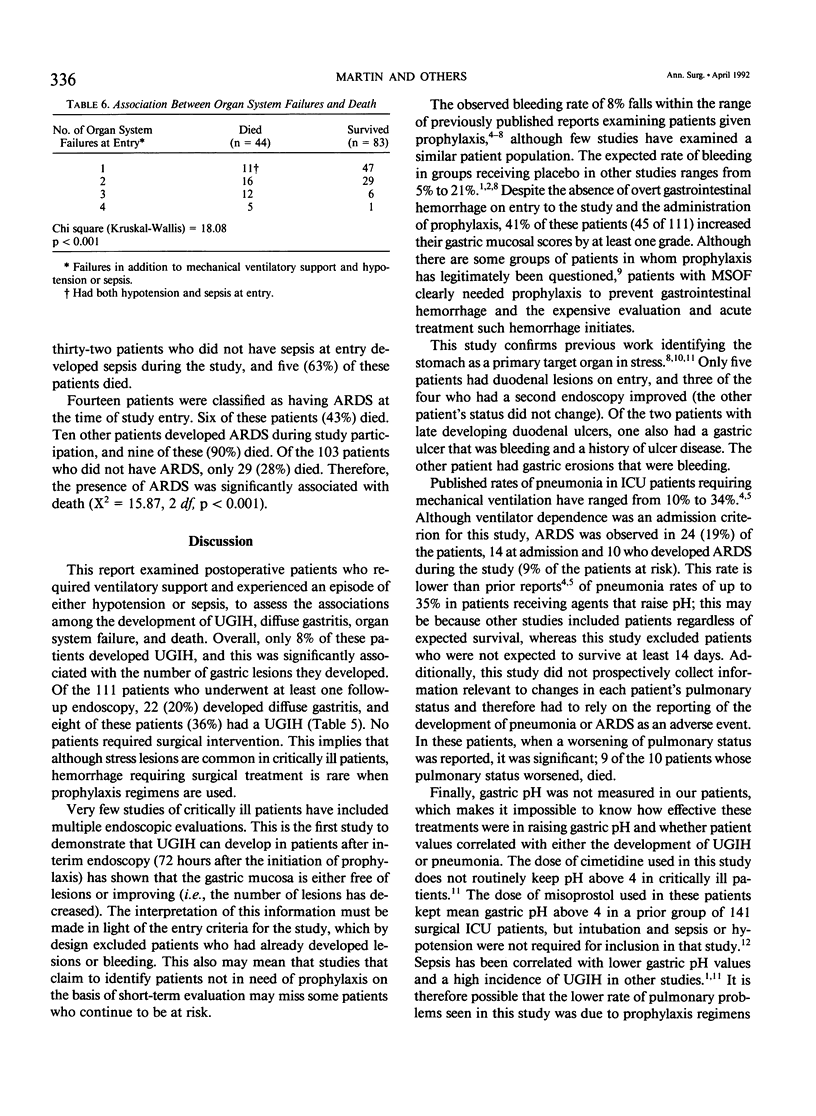
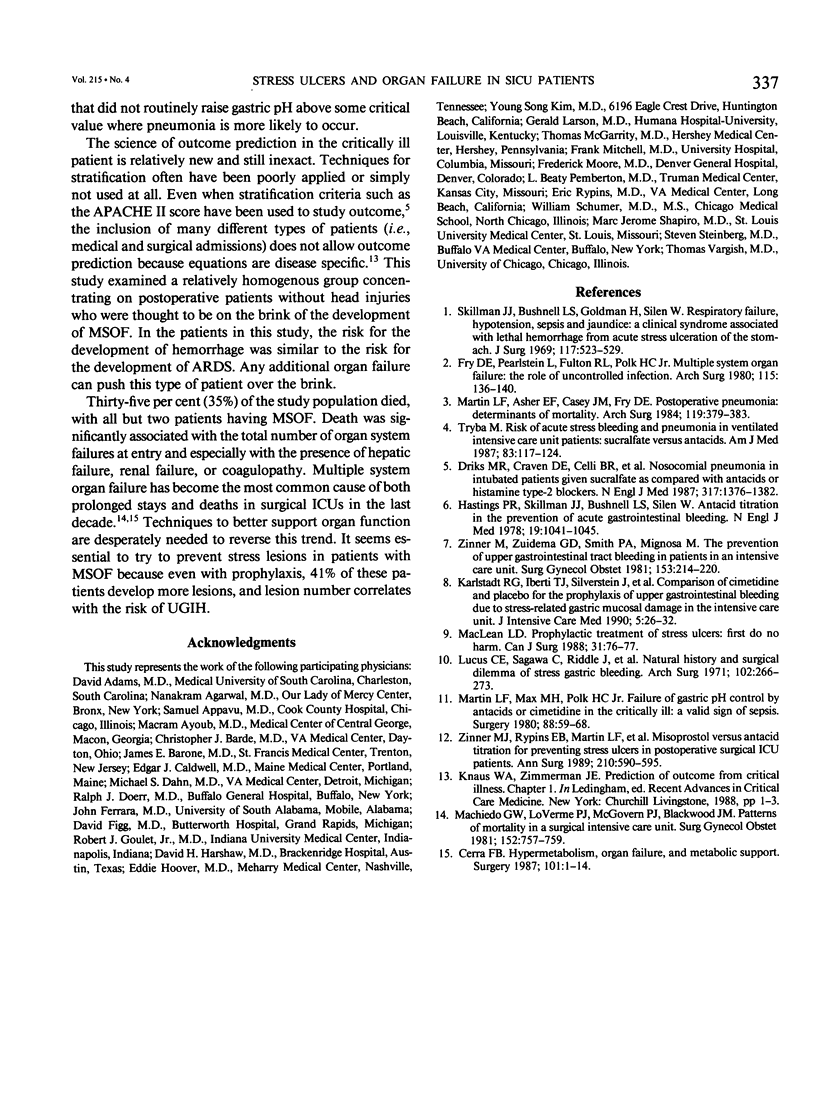
Selected References
These references are in PubMed. This may not be the complete list of references from this article.
- Cerra F. B. Hypermetabolism, organ failure, and metabolic support. Surgery. 1987 Jan;101(1):1–14. [PubMed] [Google Scholar]
- Driks M. R., Craven D. E., Celli B. R., Manning M., Burke R. A., Garvin G. M., Kunches L. M., Farber H. W., Wedel S. A., McCabe W. R. Nosocomial pneumonia in intubated patients given sucralfate as compared with antacids or histamine type 2 blockers. The role of gastric colonization. N Engl J Med. 1987 Nov 26;317(22):1376–1382. doi: 10.1056/NEJM198711263172204. [DOI] [PubMed] [Google Scholar]
- Fry D. E., Pearlstein L., Fulton R. L., Polk H. C., Jr Multiple system organ failure. The role of uncontrolled infection. Arch Surg. 1980 Feb;115(2):136–140. doi: 10.1001/archsurg.1980.01380020006003. [DOI] [PubMed] [Google Scholar]
- Hastings P. R., Skillman J. J., Bushnell L. S., Silen W. Antacid titration in the prevention of acute gastrointestinal bleeding: a controlled, randomized trial in 100 critically ill patients. N Engl J Med. 1978 May 11;298(19):1041–1045. doi: 10.1056/NEJM197805112981901. [DOI] [PubMed] [Google Scholar]
- Lucas C. E., Sugawa C., Riddle J., Rector F., Rosenberg B., Walt A. J. Natural history and surgical dilemma of "stress" gastric bleeding. Arch Surg. 1971 Apr;102(4):266–273. doi: 10.1001/archsurg.1971.01350040028006. [DOI] [PubMed] [Google Scholar]
- MacLean L. D. Prophylactic treatment of stress ulcers: first do no harm. Can J Surg. 1988 Mar;31(2):76–77. [PubMed] [Google Scholar]
- Machiedo G. W., LoVerme P. J., McGovern P. J., Jr, Blackwood J. M. Patterns of mortality in a surgical intensive care unit. Surg Gynecol Obstet. 1981 Jun;152(6):757–759. [PubMed] [Google Scholar]
- Martin L. F., Asher E. F., Casey J. M., Fry D. E. Postoperative pneumonia. Determinants of mortality. Arch Surg. 1984 Apr;119(4):379–383. doi: 10.1001/archsurg.1984.01390160015003. [DOI] [PubMed] [Google Scholar]
- Martin L. F., Max M. H., Polk H. C., Jr Failure of gastric pH control by antacids or cimetidine in the critically ill: a valid sign of sepsis. Surgery. 1980 Jul;88(1):59–68. [PubMed] [Google Scholar]
- Skillman J. J., Bushnell L. S., Goldman H., Silen W. Respiratory failure, hypotension, sepsis, and jaundice. A clinical syndrome associated with lethal hemorrhage from acute stress ulceration of the stomach. Am J Surg. 1969 Apr;117(4):523–530. doi: 10.1016/0002-9610(69)90011-7. [DOI] [PubMed] [Google Scholar]
- Tryba M. Risk of acute stress bleeding and nosocomial pneumonia in ventilated intensive care unit patients: sucralfate versus antacids. Am J Med. 1987 Sep 28;83(3B):117–124. doi: 10.1016/0002-9343(87)90840-0. [DOI] [PubMed] [Google Scholar]
- Zinner M. J., Rypins E. B., Martin L. R., Jonasson O., Hoover E. L., Swab E. A., Fakouhi T. D. Misoprostol versus antacid titration for preventing stress ulcers in postoperative surgical ICU patients. Ann Surg. 1989 Nov;210(5):590–595. doi: 10.1097/00000658-198911000-00004. [DOI] [PMC free article] [PubMed] [Google Scholar]
- Zinner M. J., Zuidema G. D., Smith P[L, Mignosa M. The prevention of upper gastrointestinal tract bleeding in patients in an intensive care unit. Surg Gynecol Obstet. 1981 Aug;153(2):214–220. [PubMed] [Google Scholar]



